The Coldingen Industrial Estate on the East Coast Demerara is limping along more than a dozen years after being opened and having never truly achieved its intended objective as a bustling business hub.
Opened in 1997 to the tune of $200M with 38 plots, there are now about a dozen businesses operating on some 39 acres of land. Several businesses have closed; plots are overrun with vegetation; and what was expected to be a site generating over a billion dollars in revenue is now in part a ready pasture for cows, goats and sheep. Observers say it is ample testimony to the fact that in this area the demand for space for manufacturing and industrial operations is not there.
Numerous efforts by this newspaper to get a comment from Commerce Minister Manniram Prashad were unsuccessful while an officer in the ministry’s Industrial Development Division said any information pertaining to the estate would have to be obtained from Prashad.
The owner of a furniture factory who chose to remain unnamed said it seemed as though the government had forgotten there was an industrial estate at Coldingen.
“This industrial estate has been neglected. The only time you see officials is when they come to remind you to pay,” he said.
According to the businessman, the place has been deteriorating over the years with poor facilities and little upkeep.
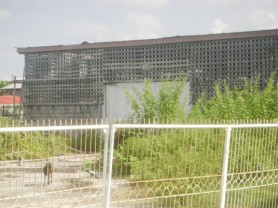
“The place looks like a dump heap; no drains or bridges have been maintained since 2007 when I started here. We used to pay a lump sum for the upkeep of the place but now is everybody for themselves. I even called NICIL about the garbage situation and they never got back to me,” he told Stabroek News.
The factory owner said business had been bad and blamed it on people not wanting to travel past the once volatile community of Buxton as well as the importation of cheaper goods.
“We don’t get much business now because people don’t want to pass Buxton. Business has been really bad and this is my worst year since 2007 because people are importing furniture now under free trade, so the locals suffering. Importation is the biggest underminer and the public is not educated enough.”
The businessman also decried the VAT system saying that smaller operators were getting away with not contributing to the national coffers.
“Government is penalising us to pay VAT when you have the bottom-house operations doing the same thing and don’t have to pay like us. They buy from the same places like us. I want the government to do something about it. We must have a level playing field because it’s not easy maintaining a business.”
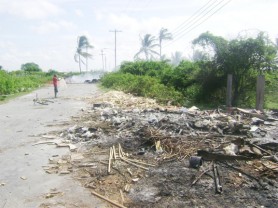
The visibly concerned businessman said he was “frustrated” because he did not have any orders for the Christmas season and may have to send home his staff which numbers around 16 persons. He added that security and the electricity bill were other problems he had to deal with.
“I had to put two people to stay here as security. And it’s not easy lighting up this place because I don’t have the volume of business to justify using a generator.”
However, the manufacturer said he was staying in the business because it was all he knew and he had invested in the machinery and had workers to think about.
“But believe me I’m looking for other avenues. Maybe I’ll turn it into a bond and start importing from China,” he remarked.
But over at Summerson’s Furniture, there was a lighter air and the hope that things were going to be better. Owner Shawn Summerson said he believed the government was doing a good job in creating a facility to enable employment for members of the community. His biggest challenge he said, was the electricity bill.
“Power is a big man. It raises the necessity for more jobs to deal with it but sometimes it appears no matter what you do the bill doesn’t reflect any difference,” he said.
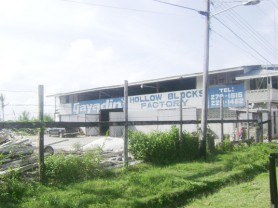
Summerson also commented on the state of the physical environment saying it left a lot to be desired.
“We should be able to keep the environment clean. There was a period when you had to pay a sum of money to upkeep, but then a lot of people weren’t paying and the guy who used to do it stopped. Everybody try to do their place and if everybody clear their part we could make it.”
The businessman, who employs some 18 persons, said he had never had a security problem in the five years he had been operating at the estate.
Summerson’s Furniture is one of nine local entities being geared to participate in an international trade fair in Canada in January through a CIDA-funded programme which is being run by the Guyana Manufacturing and Services Association.
Over at Automatic Engineering, Mitra Singh’s concern is primarily about expanding his working space.
“We started last May and we renting this place. We apply for years now for land from the government to build our own foundry and up to now we ain’t get no favourable response; they got we here and there,” he said
The businessman said he had applied for land at several locations but noted that the Coldingen site was best suited for them because most of his customers were rice farmers on the upper East Coast Demerara while his staff was from the lower part of the same corridor. But he added that he needed some three to five acres of land to have the factory function efficiently.
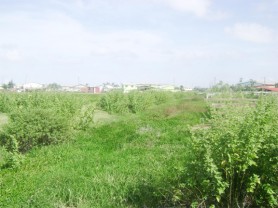
“We get some concessions from the government but the concession we want right now we ain’t getting, which is land. We really need that because when you renting half of your profits going to that and then you got limitations on what you can do on the land. Right now most of our stuff we have to do outside and I had to put up a shed for my workmen,” he explained.
Singh said there was land available in the estate that was not being utilised and he would be willing to purchase a plot to expand his business.
“By Denmor got a big lot. They told us that they giving it out but they want to buss it in two. They give somebody else and the person gone away; so far they haven’t come up with an idea what they doing with it. Then they got a next place, someone of the chemical places have a land. They were building but people stole everything from them so the land left there.”
As it relates to electricity costs, Singh said he self-generates to run the factory. He added that they had applied for a pre-paid meter but were encountering problems getting the instrument.
“With GPL we apply for a pre-paid meter a couple months now and they do two investigations. What we do we run just our security lights off of GPL and we run generator all the time because if I got to pay GPL I won’t be making any profit. But for months they got us running,” he said.
The businessman said they had been able to survive because of the farmers’ need for grain carts and machine parts, while he also supplied parts for a mining operation run by a relative.
But of all the businesses in the estate Denmor Garment Factory has been acknowledged as the most successful over the years, supplying garments to overseas clientele.
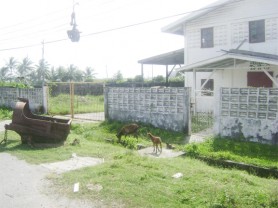
“The records would show that we were the first to open here when this estate was open. I thought it was a good venture and we came. We’ve never regretted it because I think we are sort of serving the purpose and the intent of what we wanted to do,” owner and managing director, Dennis Morgan Mudlier told Stabroek News.
With a staff numbering close to 1000, Denmor has been supplying some notable names in the apparel business over the years.
“We have some orders for New Balance, we are working for Dix Sportswear, besides we are doing now ballet garments for the schools in Miami and then Russell Athletics is a division of Fruit of the Loom, so we are doing some work for them,” he said.
His challenges, Mudlier said, came primarily from the global marketplace with the Chinese garment industry proving to be one of the biggest, with others like Mexico, India and Bangladesh also in the picture. But he added that they had been able to hold their own by entering into niche markets through supplying the high-end products for recognisable brands who found it more profitable to go with a smaller manufacturer.
As it relates to the Coldingen estate, Mudlier bemoaned the poor street lighting and the abundance of stray animals which roamed the compound.
“A lot of us here try to keep our areas clean, but what we notice is a lot of people bringing in their cows and all these things and they let them inside here, and in my mind it’s something that should be discouraged, not forgetting that in our case we are working for international companies. Sometimes people come in and the cows are all over and mess up the place,” he stated.
Denmor self-generates and uses GPL, and Mudlier said that way they were able to keep their electricity costs at a certain level. He added that since they started operations they had not had a problem with crime.
“Let me say thank heavens so far that since we’ve been here and we’ve been here from the beginning, despite all the many troubles with crime this estate was never under threat at no point in time,” he declared.
Mudlier added that he believed that the infrastructure was in place at the estate for businesses to make a start and that people should stop complaining. “Everything is there and in business today it’s you taking on the challenge; it’s not about complaining because there’s no ideal situation, you got to get out there and do what it takes if you’re to be successful,’ he said.
When Stabroek News visited the estate it was observed that several of the premises were locked up, while some plots were overgrown and still others encumbered with the skeletal remains of buildings. At the back of the estate a dump heap was smoking sullenly. Most of the businesses still in operation were running with minimal staff. Animals could be seen dotted around the site to which there was easy access through the open, unmanned gates.





